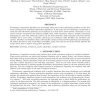Free Online Productivity Tools
i2Speak
i2Symbol
i2OCR
iTex2Img
iWeb2Print
iWeb2Shot
i2Type
iPdf2Split
iPdf2Merge
i2Bopomofo
i2Arabic
i2Style
i2Image
i2PDF
iLatex2Rtf
Sci2ools
CORR
2004
Springer
2004
Springer
Exploring tradeoffs in pleiotropy and redundancy using evolutionary computing
Evolutionary computation algorithms are increasingly being used to solve optimization problems as they have many advantages over traditional optimization algorithms. In this paper we use evolutionary computation to study the trade-off between pleiotropy and redundancy in a client-server based network. Pleiotropy is a term used to describe components that perform multiple tasks, while redundancy refers to multiple components performing one same task. Pleiotropy reduces cost but lacks robustness, while redundancy increases network reliability but is more costly, as together, pleiotropy and redundancy build flexibility and robustness into systems. Therefore it is desirable to have a network that contains a balance between pleiotropy and redundancy. We explore how factors such as link failure probability, repair rates, and the size of the network influence the design choices that we explore using genetic algorithms.
CORR 2004 | Education | Evolutionary Computation | Evolutionary Computation Algorithms | Pleiotropy |
Related Content
| Added | 17 Dec 2010 |
| Updated | 17 Dec 2010 |
| Type | Journal |
| Year | 2004 |
| Where | CORR |
| Authors | Matthew J. Berryman, Wei-Li Khoo, Hiep Nguyen, Erin O'Neill, Andrew Allison, Derek Abbott |
Comments (0)

